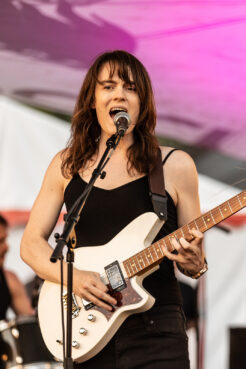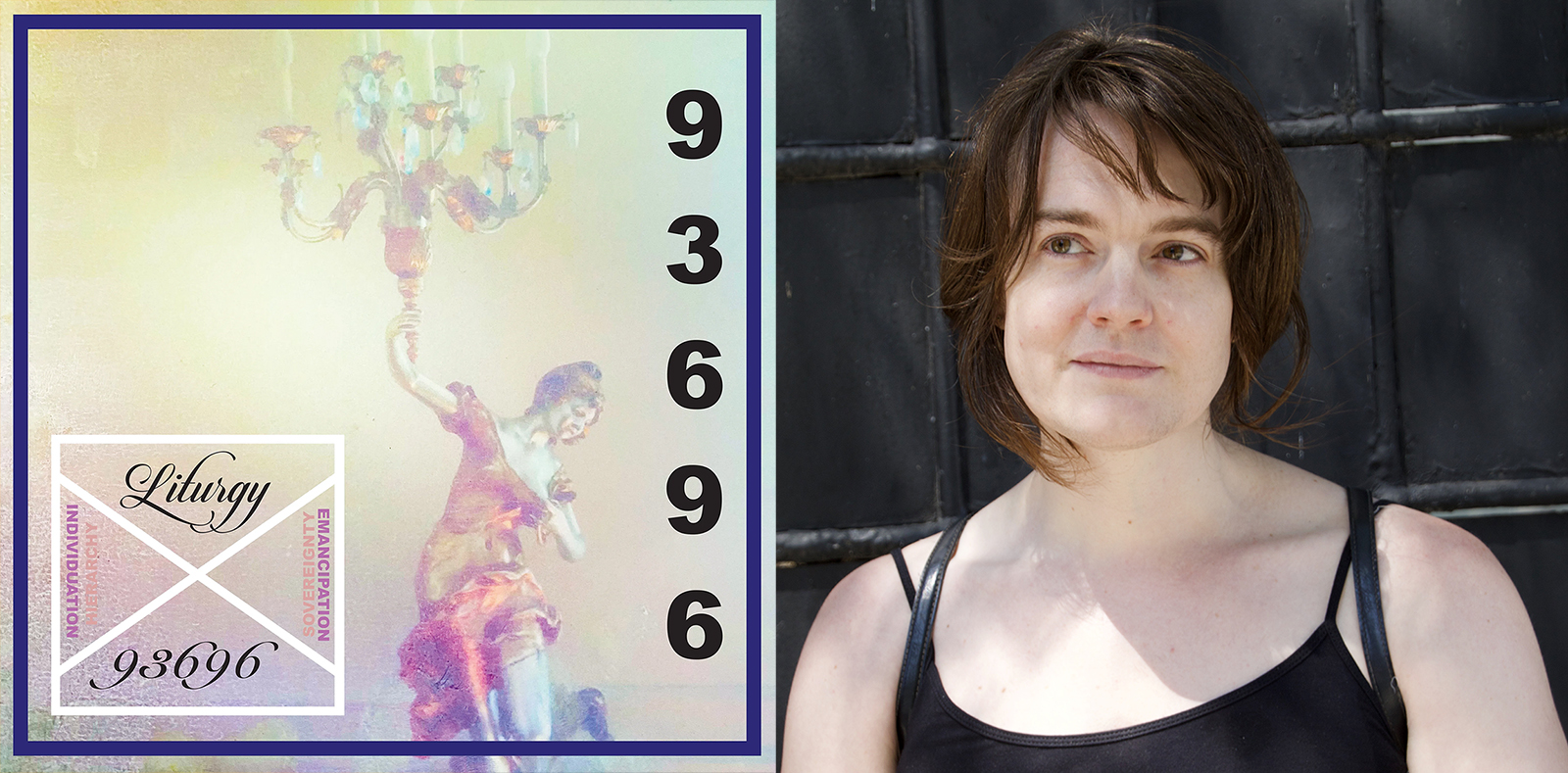NEW YORK (RNS) — Onstage with only a guitar, microphone and pedal board, Haela Hunt-Hendrix can sound angelic one moment and feral the next. Her solo set, drawing from songs from across her band Liturgy’s six-album catalog, shifts between delicate, hymnlike passages and bloodcurdling screams that leave audiences hushed in anticipation. The music is both hypnotic and jarring, seemingly determined to unsettle.
Hunt-Hendrix, 40, is best known as the front woman of Liturgy, the Brooklyn avant-garde black metal band that has divided listeners since its 2008 EP debut, “Immortal Life.” Over the past 15 years, the band has redefined what metal can sound like, blending its signature burst beats, a rhythm more flexible and repetitive than the genre’s standard blast beat, and howls with choral arrangements, classical influences and theological themes. The band’s minimalist aesthetic has remained, but theological and philosophical symbols have become more prominent in newer work.
In 2020, Hunt-Hendrix came out publicly as queer and now identifies as a transgender woman. Four years later, she was christened into the Orthodox Christian church in New York City. Her solo tour this summer, which started in Manhattan on Aug. 1 and ends Saturday (Sept. 6), includes first-time performances in Turkey, Indonesia and Malaysia. The set reflects Hunt-Hendrix’s rare blend of spiritual and personal reflections, weaving together her embrace of queerness, her Orthodox faith and her relentless reshaping of metal music.
“Queerness and metal is a pretty hard mix,” Hunt-Hendrix said in an interview with RNS. “Then queerness and faith is a hard mix, and metal and faith is a hard mix. But, like, there’s a kind of a logic to it. My personal opinion is that I’m in touch with the truth or something, and that more and more people will sort of see the truth over time.”
This sense of mission has been with her for more than a decade. In 2009, Hunt-Hendrix presented her academic and artistic manifesto, “Transcendental Black Metal: A Vision of Apocalyptic Humanism,” at the Black Metal Theory symposium, later published in the “Hideous Gnosis” compendium and circulated online. In it, she argued that black metal’s trademark nihilism and darkness could be recast as transcendent, even sacred, and that Liturgy would be the band to lead the transformation.
“Black metal is really esoteric, kind of scary, but, maybe in touch (with) a sort of authentic religiosity, even though it’s so dark,” Hunt-Hendrix said. “To me, I really wanted to push that even further — kind of like Christ descending into hell and being resurrected.”
RELATED: Rock music has had sympathy for God as well as the devil – Kennedy Center honoree Amy Grant is just one big star who’s walked the line between ‘Christian’ and ‘secular’ music
Black metal emerged in the 1980s and early 1990s in Norway, most notoriously through the band Mayhem. The genre is infamous for its harsh anti-Christian stance and violent acts, which include church burnings.
“There was this rejection of Christian society and everything that it represented,” said Marcus Moberg, professor of religious studies at Åbo Akademi University in Finland and author of “Christian Metal: History, Ideology, Scene.” “Not simply the religious part of it, but Christian respectability.”
Moberg said early black metal musicians saw defiance of Christian values as liberation from what they considered the pious and repressive constraints of society. “The band Liturgy certainly does transgress the boundaries that black metal has set up for itself,” he said.

Haela Hunt-Hendrix plays at the Moers Festival 2022 in Moers, Germany. (Photo by Harald Krichel/Wikimedia/Creative Commons)
If black metal, to some, represents hell, then its resurrection in Hunt-Hendrix’s vision is “transcendental black metal,” she said.
“My music is all about God,” Hunt-Hendrix said. “It’s like I’m seeking to paint a picture of heaven, or bring God, and that’s always just kind of felt like something I had to do.”
When Hunt-Hendrix first published her manifesto, it drew a mixed response from the metal community. Ross Hagen, a music studies professor at Utah Valley University and metal scholar, recalled reading it online.
“What I mostly remember from the online communities was a kind of knee-jerk reaction against the academic-ness of it,” Hagen said. “And also, the underlying theme that black metal has gone stagnant and we need to provide a change for it and my band is the way that it’s going to go, I think, rubbed people the wrong way.”
Hagen said part of the backlash came from a paradox at the heart of the black metal genre. “When the anti-establishment nature of black metal becomes its own orthodoxy, it invites its own subversion,” he said.
Today, Hunt-Hendrix, who studied philosophy and classical music composition at Columbia University in New York, said she believes her music still walks in step with the ideas outlined in her 2009 manifesto. The difference now is the expansion of her faith.
“As I’ve studied more and my faith has continued on, to me, being a part of a church and participating in the actual Christian liturgy is now really important,” Hunt-Hendrix said. “I’ve become much more, like, literally theistic.”
Classical music is also a clear influence on Liturgy’s latest work. On the latest album, “93696″, released in 2023, angelic choral passages, light piano and lyrics drawn from the hierarchy of angels collide with experimental rhythmic beats, screeching vocals and crashing guitars. The result is an intense work that channels what Christians might describe as the experience of having one’s heart set ablaze with Christ’s love. Immersed in harmony, counterpoint and avant-garde techniques, the band pushes metal into more experimental territory, breaking away from its rigid rhythmic structures to create a sound at once operatic and disruptive.
Hunt-Hendrix’s search for transcendence began even earlier. As a teenager, she found a sense of the sublime in dark music, noting the “shock and grandeur” of Marilyn Manson, Nine Inch Nails and Aphex Twin. Later, in the sweeping soundscapes of post-rock bands like Godspeed You! Black Emperor and Explosions in the Sky, she sensed what she called “the glory of God without being religious.”
Gabriel Hollis, a pianist, software engineer and Christian, opened one of Hunt-Hendrix’s solo shows last year at Le Poisson Rouge in Brooklyn with a 12-minute piano set. “I think it can be said that metal music finds many of its roots in classical music,” Hollis said. “So much classical music was composed in an explicitly worshipful manner.” Hunt-Hendrix’s work, he added, is “exemplary worship music.”
“Christians need to pay attention to it — Christians of all denominations, even who might have some harsh differences with her on a political or religious level,” he said.
As a trans woman, Hunt-Hendrix rejects the idea that her gender should contradict her Orthodox Christian faith. “I don’t see a contradiction with my faith and my gender identity,” she said. “Early church fathers said that prior to the fall, Adam and Eve had no gender … that gender is a post-fall artifact.”
Arguments that Christianity requires strictly biological understandings of gender, she said, are shallow. “That’s superficial,” she said. “It’s not what Christ was about.”
Metal has roots in stereotypical masculinity and hateful or aggressive ideologies, and in today’s scene, queer artists still remain relatively rare. According to research published in 2018, metal music production historically has been dominated by men, with women making up only about 3% of all metal musicians and vocalists. Despite this, Hagen said he has observed some shifts in the past 10 years. “I would say that there is consciously more room for female-fronted and very queer-forward bands out there today,” Hagen said.
RELATED: Why religious leaders are divided on transgender rights
After her solo tour wraps, Hunt-Hendrix said she isn’t sure what comes next.
“Sometimes I think that I should actually just write liturgical music,” she said. “I kind of just want to set the Orthodox liturgy to music and close that gap.”
That gap between black metal’s nihilism and a transcendent, God-centered music has long been at the heart of her music’s mission.
“Our world is changing quite a lot, and I think that more and more, all that’s really going to matter to people is religion,” Hunt-Hendrix said. “There won’t be much else to do that feels real, maybe, right? So, I mean, all the more reason to just actually make liturgical music. But we’ll see what happens.”


